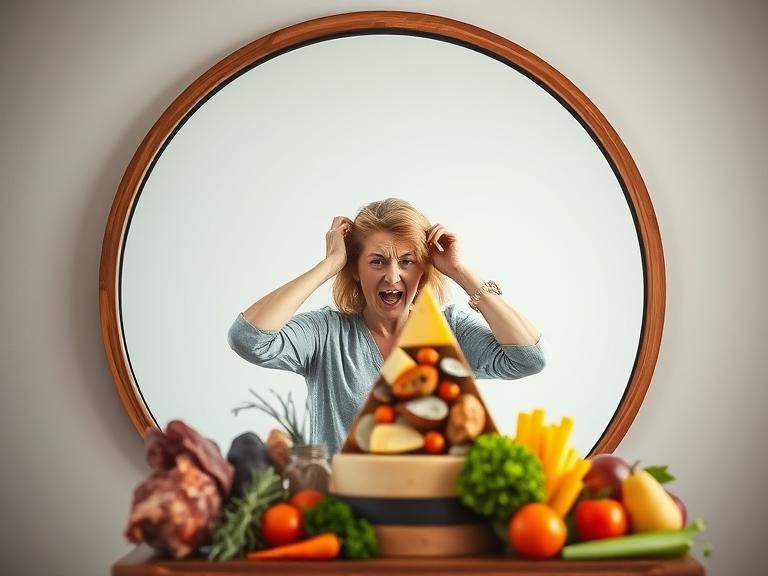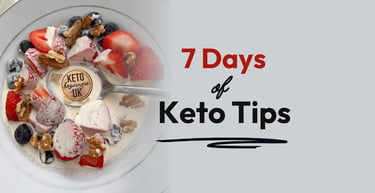What is a Balanced Diet?
Understanding macronutrients and how they're key to combatting middle-age spread.
Lisa Beaumont, Ketogentility.co.uk
6/12/20254 min read


Why Is Your “Balanced Diet” No Longer Working For You?
You used to be able to eat half a tin of Quality Street in one sitting, and bounce back. Now? You reluctantly decline all foods that could be perceived as any fun whatsoever, try to exist on small salads, low-fat Philadelphia and "diet foods" while sipping on a green tea telling yourself you're enjoying it. Yet you're still growing around the middle, you feel miserable, and you're all out of ideas. Welcome to middle age.
If you’ve suddenly acquired a mystery muffin top, stiff joints, weird indigestion, general “meh” vibes—it’s not so much that you're ageing, but more that you no longer have youth on your side to counteract an inoptimal mix of macronutrients. "Ugh, Lisa, I don't even know what you're talking about!" It's alright I've got you.
Let’s break it down.
What Are Macronutrients, Anyway?
There are three macronutrients—fancy word for the stuff we eat in bulk:
Protein – builds and repairs your body. Think of it as scaffolding for your muscles, organs, hair, skin, nails… and your dignity.
Fat – fuels your brain, hormones, energy and keeps your cells sleek and slippery.
Carbohydrates – the cheap thrill of energy. Burns fast, crashes hard.
That’s it. You’ve been balancing these since birth, mostly without a clue.
But here’s where it gets interesting: your body needs only two of these to survive and thrive.
Guess which one you don’t need?
Carbs (Surprise!): The Optional Macronutrient
Surprise! There is no biological requirement for us to eat carbohydrates. None. Nada. Zilch.
As Professor Bart Kay, former lecturer in cardiovascular physiology and exercise biochemistry, often says, your liver is a magnificent little chemist. It performs gluconeogenesis, creating all the glucose your body needs from protein and fat - and it does this whether or not there are carbs in the food you eat. Even your precious brain is perfectly happy running on ketones.
So when you hear, “Your brain needs sugar,” feel free to smile politely and change the subject to literally anything else. Like gluconeogenesis. ;)
Why the “Balanced Diet” Is a Balanced Disaster
We’ve all heard the phrase: “You just need a balanced diet.” It sounds harmless, even sensible. But what does it actually mean?
Usually, it refers to some vague, mathematically appealing combo of:
~50% carbs (bread, pasta, cereals, fruit, grains)
~30% fat (some good, most inflammatory seed oils)
~20% protein (mostly tasteless chicken breast, tofu, and sadness)
This “balance” is great—if you want to stay inflamed, sluggish, and fatter every year despite eating “moderately.”
Why? Because carbs trigger insulin - the hormone required to take glucose (from carbs/sugar) out of your bloodstream and get it into your cells. And insulin’s job is to store fat and block fat burning. When insulin’s always high (thanks to your "balanced" breakfast cereal), your body stays in storage mode.
Now add joint pain, reflux, brain fog, the mid-afternoon energy-slump, and hormonal weirdness to the mix and you’ve got yourself a full house of modern misery.
But I Thought Wholegrains Were Healthy?
Bless you. So did we all.
Here’s the catch: wholegrains, brown rice, quinoa, and “healthy carbs” still spike your blood sugar. They're still carbs. They still call insulin to the scene. And if you're already insulin resistant (and most people over 40 are), they just keep making things worse.
Your gut, joints, and waistline aren’t broken. They’re just responding appropriately to a diet that doesn’t suit human biology.
What You Actually Need for Healing & Fat Loss
Let’s unlearn the nonsense and get to what works.
If you want to:
lose stubborn weight,
stop bloating after every meal,
reclaim your energy,
soothe your inflamed joints,
and actually feel younger…
…you need to eat in a way that keeps insulin low, inflammation down, and nutrients high.
How?
Eat like a human animal.
Fatty meat – ribeye, lamb chops, pork belly, eggs, liver if you’re brave.
Animal fats – butter, dripping, tallow. (Not seed oils nor margarine, ever.)
Sea salt – generously. You’re not retaining water, you’re probably deficient.
Water – with electrolytes (hello, Celtic sea salt).
Zero to very low carbs – ideally almost none, especially if you're trying to heal.
But Don’t We Need Fibre?
Ah yes, the old “you’ll get constipated without fibre” myth. Funny how humans survived for 2.5 million years without All-Bran.
Turns out, when you’re not constantly irritating your gut with fibrous bulk and fermentable carbs, things flow just fine. Ask any seasoned carnivore. The bowel movements are majestic and uneventful.
What Happens When You Drop Carbs?
According to Dr Ken Berry, a GP-turned-keto-carnivore crusader, people see enormous benefits when they stop eating the “balanced” way:
Weight loss without calorie counting
Reversal of Type 2 diabetes
Clearer skin, sharper mind, deeper sleep
No more joint pain or GORD
He calls it “proper human diet” because that’s what it is—biologically appropriate food for the species called Homo sapiens.
And no, you don’t need “cheat days.” You’re not cheating; you’re escaping.
Final Thoughts: You’re Not Broken. You’re Just Eating Wrong.
Middle-age spread, early aches and pains, rising blood sugar, weird little diagnoses that doctors shrug off as “normal at your age”—they’re not your destiny. They’re just the results of modern macronutrient mismanagement.
You don’t need balance. You need biology.
So if your “balanced diet” is balancing you right into fatigue, fat storage, failing joints, and frustration—it’s time to flip the plate.
Eat like a human. Heal like one.
Need some help figuring it out, or just a bit of support, or simply to be around likeminded people who get you? Come over to my friendly Facebook Group where I teach the basics of the keto diet to other lovely Brits like yourself.
Lisa@ketogentility.co.uk
© 2025. All rights reserved.


